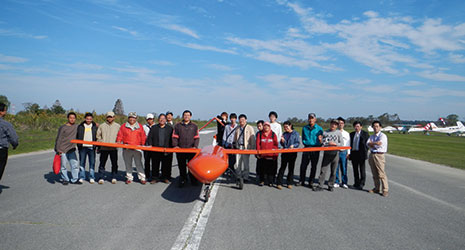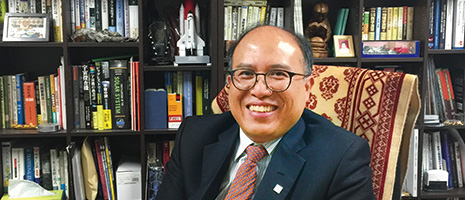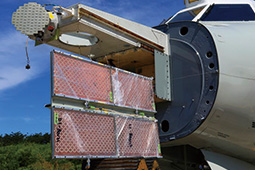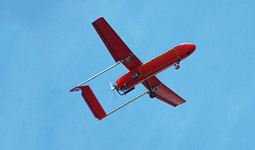February 2020
From the Sky to Space and Beyond

A native of Indonesia, Josaphat Tetuko Sri Sumantyo is working on research and development of “remote sensing” technologies, which could aid in disaster prevention.
Josaphat Tetuko Sri Sumantyo, a professor at Chiba University’s Center for Environmental Remote Sensing, is a specialist in remote sensing microwave radar systems for the observation of long-distance targets, conducting research and development in the field in addition to teaching. Remote sensing works by illuminating the earth’s surface with radio waves from satellites and aircraft, then analyzing and visualizing the scattering waves, allowing for observation of a wide range of surface conditions. Visualizing land deformation, for example, can be used to develop natural disaster countermeasures, and the ability to observe plant growth, waves on the ocean’s surface, and other phenomena has an extremely wide range of applications. Josaphat, from Indonesia, has developed his own remote sensing system, the Circularly Polarized Synthetic Aperture Radar (CP-SAR), which utilizes microwaves’ ability to penetrate clouds, fog and smoke to obtain more accurate and detailed surface data.


“Like Japan, Indonesia has many earthquakes and much volcanic activity. I developed CP-SAR to closely observe land deformation brought about by this volcanic activity. It can sense changes in land surface movement as slight as 1 cm per year,” explains Josaphat. “As human impact on the environment continues to increase, sensing technology will also be indispensable in achieving balance between food and energy resources. It can even be used to survey new planets, should humanity ever take to the stars one day. That’s my dream.”
When Josaphat was a child, back in the 1970s, Indonesia’s domestic aircraft development was taking off. Building aircraft was a dream shared by many Indonesian children. Josaphat says that he too would often fly model airplanes that he designed himself. In 1989, after he had entered university, he was selected from among 15,000 applicants to travel to Japan and study at Kanazawa University’s Department of Electrical and Information Engineering, as the recipient of a study abroad scholarship offered by the Ministry of Research and Technology of the Republic of Indonesia. He later obtained his PhD in Engineering at Chiba University in 2002.
“The environment at Chiba University greatly furthered my research. I think I was fortunate to study abroad in Japan. I’ve been able to develop sensor-equipped unmanned aerial vehicles (UAV) here as well, so you could say that it helped me realize my dream of building airplanes too,” Josaphat says, smiling.

The Center for Environment Remote Sensing serves as Asia’s hub for remote sensing research. Together with his research students, Josaphat has joined a technological cooperative with the Japan International Cooperation Agency (JICA) to create a landslide map for the Malay peninsula, as well as an international joint research project to estimate food supply issues that could occur alongside Indonesia’s changing urban landscape. Many non-Japanese students, including those from Indonesia, have joined Josaphat’s laboratory, and Josaphat says it is heartening to see ties between Japan and these countries grow stronger as graduates continue their research even after returning home.
Josaphat set up a foundation in 2001 to provide scholarships to Indonesian children who dream of becoming researchers in the future. Josaphat says that he cried tears of joy around the end of last year when he learned that the scholarship’s first recipient had been granted a research position.
Josaphat is currently researching the relationship between earthquakes and changes in electron density within the ionosphere (an atmospheric layer containing many ions and electrons, more than 60 km above the earth’s surface) in an effort to predict earthquake occurrences. Additionally, he is working to develop a sensor in order to predict volcanic eruptions.
“Even if I’m busy, I’m doing what I love. I want to continue researching sensing technology, to make a difference worldwide.”

